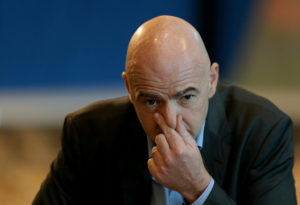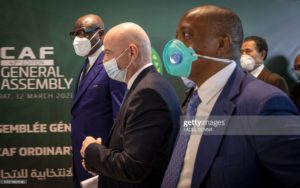African Super League: saviour or killer of club football?

Less than a year on from FIFA’s vehement opposition to the European Super League, President Gianni Infantino was in Cairo to support the launch of the African Super League.
The league was approved by the Confederation of African Football (CAF) at the Extraordinary General Assembly where they also became the first federation to approve FIFA’s controversial proposal to investigate making the World Cup a biennial tournament.
What’s so different about Africa?
The question is, why would a Super League that was shut down in Europe by nearly every stakeholder within 72 hours of its launch work in Africa?
The competition was first mooted by Infantino in 2020. Since the initial announcement and even the official endorsement of CAF, there has been no information released about the format or structure of the league by either CAF or FIFA.
Despite the lack of details, South African billionaire president of CAF, Patrice Motsepe, boldly declared that the competition will generate USD 3 billion over a five-year cycle. This incredible claim comes in the context of a media landscape completely bereft of broadcasters.
In 2017 the rights to all CAF assets were sold to Lagardère, a French sports agency. The mouth-watering USD 1 billion deal seemed too good to be true, and was proven so when it collapsed and was cancelled in 2019 by CAF.

Since then, there have been no long-term broadcasting deals for CAF competitions. The Champions League and Confederations Cup, Africa’s premier club competitions, hardly generate any money from broadcasting and sponsorship.
How could an African Super League look?
The Super League is rumoured to take the shape of 20 teams that are permanent members with an additional four qualifying regionally. How CAF will choose those 20 teams is a mystery.
Because there is less money in African football than there is in Europe, there is not a clear group of super clubs that pick themselves. There are a small number of clubs that are shoe-ins to participate, but beyond those there are numerous teams that would have a valid claim to it.
Take Algeria, for example. JS Kabylie are the most successful club in the country historically and were runners up in this year’s Confederation Cup. CR Belouizdad are the current champions, but both of these clubs are much smaller than USM Algiers who are incredibly well supported but have really struggled in recent years.
Other clubs like Simba and Yanga in Tanzania have next to no continental pedigree. However, thanks to incredible local support bases, a well organised league, and committed investment, both clubs are expected to start challenging on the continent and surely could not be left out of any Super League.
Elsewhere, in DRC, TP Mazembe and AS Vita are two of the most decorated clubs in sub-Saharan Africa. But both clubs have been in real decline over the last couple years and were unceremoniously dumped out of the Champions League and Confederations Cup respectively by much smaller opposition.
To leave out both these clubs would be unthinkable in the continental context, but do either of them deserve to be there on sporting merit?

CAF and FIFA will ultimately choose clubs arbitrarily, killing those who are not deemed marketable enough. Players will leave other clubs to play for the Super League sides and there will be a talent drain in the rest of the leagues.
The competition will devalue domestic leagues in the countries with representatives in the Super League. If both Al Ahly and Zamelek do not need to do anything domestically to qualify, what will that do to the competitive balance of the Egyptian Premier League?
They will have less incentive to top the table and other clubs will have even less. Clubs like Pyramids or Ismaily will only need to come third to qualify for the Champions League and will get nothing more in terms of continental qualification by finishing first or second.
The beauty of the Champions League in Africa is that any club from any country can qualify, and every club must qualify for the competition.
This season saw Simba knocked out of the Champions League by Jwaneng Galaxy of Botswana in the qualifiers. Even Al Ahly, back-to-back champions, had to come through a qualifier to make it to the final stage.

A Super League would completely lock out clubs like Jwaneng who earned their place at the pinnacle of African football. In the world of a Super League, it is hard to imagine how they would benefit with the bulk of money made by the Super League going into the pockets of CAF and the clubs involved. Jwaneng would be frozen out of the competition, unable to access money and prestige in partaking and the platform it would afford their players, coaches and club.
Reform but at what cost?
African club football is in dire need of reform. The continental tournaments make almost no money and are a drain on participating clubs financially and sportingly.
These reforms can take place in the Champions League and Confederations Cup as they are. What is needed is rebranding, more expert administration to draw in sponsors and the elimination of corruption in the organisation of the tournaments. A new Super League would not address these issues while creating additional problems of their own.
The Champions League and Confederations Cup are two wonderfully historied competitions. Despite being younger than its European and South American counterparts, the African Champions League has had more winners from more countries than both the UEFA Champions League and the Copa Libertadores.
To kill the Champions League and Confederations Cup by creating a self-serving and destructive Super League would not be what brings African football into the light, but would kill its past, present and future.